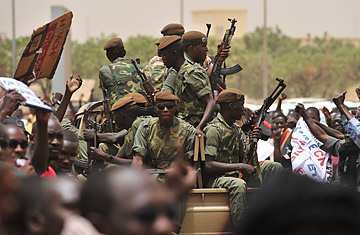
Malian military junta supporters surround car loaded with soldiers at Bamako airport on March 29, 2012 in Bamako.
They pumped their fists in the air. "Shame on Africa," they cried. And then the protesters swarmed across the runway at Bamako international, trampling over the red carpet laid out for visiting dignitaries. With a jet carrying presidents from five West Africa countries inbound, it was an eloquent statement of what many in Mali's military junta think about international condemnation of their coup — even if the soldiers in charge didn't explicitly order up the demonstration.
"I am touched that the people are joining the army — not to support an army that will stay in power, but to support an army which saved the country," coup leader Captain Amadou Sanogo said even as he appealed to the crowd to let "our African brothers" in. The tone hardly dampened suspicions that Sanogo & Co. were not taking the their international guests seriously enough. The jet carrying the presidents of Ivory Coast, Liberia, Benin, Burkina Faso and Niger banked soon after entering Malian airspace and returned to Abidjan without touching down. The feeling, an aide to Ivorian president Alassane Ouattara told the Associated Press, is mutual.
The West African leaders — who were visiting under the auspices of Economic Community of West African States (ECOWAS), the regional trade bloc — were expected to try hammering out a deal with Sanogo for a return to constitutional rule in Mali, which was rocked by an army mutiny last week. Instead they issued an ultimatum Thursday evening that they would close all borders with the landlocked country within 72 hours, cutting of supplies of gasoline and strangling the impoverished country financially, unless the junta restored Mali's constitution.
"These protesters... couldn't have got to the runway if the military didn't want them to," says Bruce Whitehouse, an assistant professor of anthropology at Lehigh University and blogger whose cogent analysis of the coup has drawn a following. The incident "makes me think the junta doesn't want to negotiate with outside powers. It makes me think they won't hand over power in the short term. It makes me think they want to hand over power on their own terms."
It was just one sign that confrontation is looming between Mali's military junta and those opposed to them. In central Bamako,three people were badly hurt when pro-junta youths descended on an opposition rally at the tree-lined courtyard of Bamako's Labor exchange. "We were having a meeting when youths, under 20-years-old, came and threw stones at us, that is when the fighting started," says Siaka Diakite of the National Workers Union, a leading opponent of the junta. Riot police restored some calm but not before vehicles had been burnt beyond recognition, and a brooding hostility had settled over the area. A foul wind whipped dust and dried leaves down the streets and chopped up the waters of the River Niger to complete the effect.
With unsettling, albeit unconfirmed, reports that a fringe presidential candidate Oumar Mariko — a powerful orator with a populist touch — has been mobilizing public opinion against pro-democracy activists, and that gangs of thugs have started threatening vocal opponents of the coup, there is a worrying echo of the events that led to civil strife in next door Ivory Coast a decade ago.
"The mutineers [have been] able to tap into a simmering, deep-seated discontent and that, more than anything else, is what's bringing people out," Whitehouse tells TIME. The fact that they managed to bill a large turn-out of supporters in Bamako on Wednesday as pro-coup and, simultaneously, for Malian soldiers battling ethnic Tuareg separatists in the country's north, "is the first sign I've seen that some of them know what they're doing. They're succeeding in tapping into a number of sources of support."
Ironically, the political chaos in Mali has left those very soldiers — often poorly equipped and insufficiently trained — leaderless and uncertain just as they face their sternest test. Rebel fighters launched a fresh attack Thursday on the strategically important town of Kidal, trading heavy weapons fire with soldiers garrisoned there. Civilians have fled the desert outpost in recent days, fighting for places on the twice-daily bus to the town of Gao, to the south, and joining an estimated 200,000 people already displaced by the Tuareg campaign.
The U.S. continues to view al-Qaeda in the Islamic Magreb as the main threat in West Africa and wants the rebels to come to the negotiating table in order for Mali to unite against the terrorist group. "If the past is prologue, this rebellion like all previous rebellions since independence will be resolved through negotiations," says Peter Barlerin, charge d'affaires at the U.S. Embassy in Bamako, referring to revolts in the 1960s, 1990s and from 2006 to 2009 "That's our fervent hope. The sooner Mali can get back to the subject of development including for the people of the north the better." But it says a lot about what's happening in Mali that even if the rebels want to cut a deal, there is no legitimate party they can treat with.
